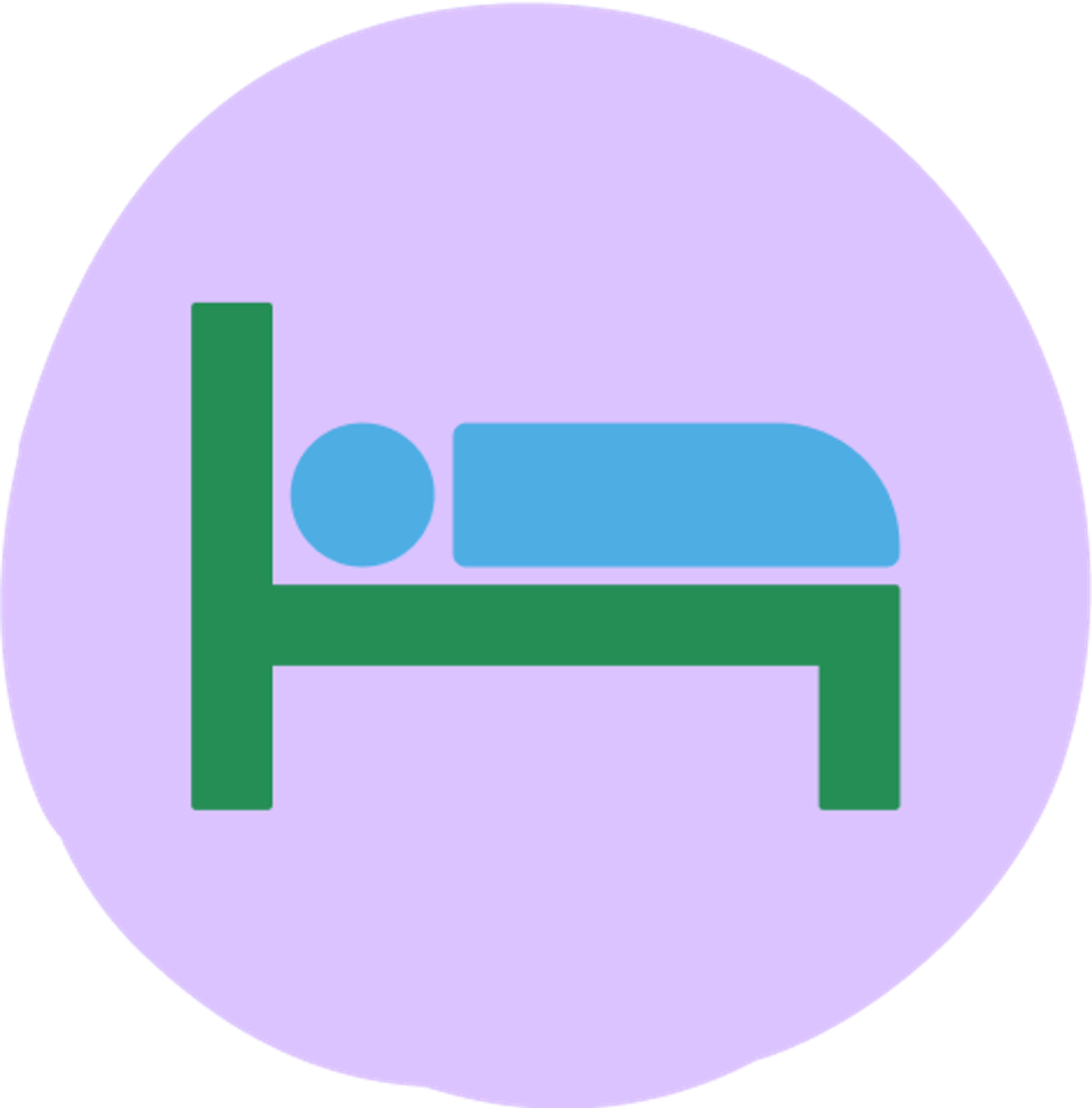Abortion Aftercare: What is it and Where to Go in Restricted States
It is not necessary to get follow up care at a hospital or clinic after an abortion unless complications occur (which are very, very rare). Still, some people want reassurance, answers to questions, or medical support — which is absolutely ok and should be supported!
This guide explains what abortion aftercare looks like for some people, when to seek help, and where you can safely get care after either a medication abortion or a procedural (in-clinic) abortion.

Optional follow-up care some people choose
Some people want follow-up care for reassurance or support. This can include:
- An ultrasound or lab test to confirm you are no longer pregnant
- Birth control counseling
- Getting answers to medical questions
- Emotional support or space to ask questions, including faith-based questions
- Emergency care, in the rare case complications happen
Most people recover safely at home without any follow up visits, but it's normal to have questions and want support or confirmation. If you're worried about your symptoms, there are resources available to you.
If you had a medication abortion and want to know what signs to look for, you can read more in our article How do I know if the abortion pills worked?

Where can I get vetted abortion aftercare in states with abortion bans?
Finding Local Follow-Up Care
If you want in-person follow-up care, I Need An A has a vetted database of providers offering miscarriage and follow-up care in restricted states. This is not comprehensive, but we’re optimistic it’s a better-than-nothing starting point. If you have providers that should be added to this list, please email us team@ineedana.com.
OB-GYNs, Clinics, and Urgent Care
Care for miscarriage, pregnancy complications, ultrasounds, and follow-up visits is allowed in all states — including states with abortion bans. Many OB-GYNs, primary care providers and clinics can provide this type of care. If you do not want to say you had an abortion, when calling to make an appointment you can say, “I had a positive pregnancy test and then I started bleeding so I would like to make an appointment to know what is happening.”
However, not all doctors or urgent care centers are equipped to treat miscarriage or complications after a pregnancy loss. In some cases, they may refer you to a local emergency department for evaluation or treatment.
And unfortunately, not all doctors may be supportive of abortion care. Again, you never have to explain how your pregnancy ended if you don’t feel comfortable. If you had a medication abortion there are no blood or urine tests for mifepristone or misoprostol.
When should I call a doctor or get medical help after an abortion?
While complications are rare, you should get medical help as soon as possible if you have any of the following:
- Heavy bleeding (soaking 2 or more heavy overnight pads an hour for 2 hours in a row)
- Fever over 101°F (38°C) or chills for 24 hours or longer
- A really foul smelling discharge with severe pain that isn't better with over the counter pain medications (like tylenol or ibuprofen), and fever are signs of an infection that should be treated immediately.
If you have questions, aren’t sure what to do, or want to talk something through, you can contact the Miscarriage + Abortion Hotline by calling or texting 833-246-2632.
If you need to go to the emergency room
You have the legal right to emergency medical care in every state, even if your state bans abortion. Emergency care includes treatment for miscarriage or pregnancy complications. This right applies regardless of your age, immigration status, or whether you have insurance.
You never have to explain how your pregnancy ended to receive emergency care. There's no way a doctor or anyone can test if someone took abortion pills or had a spontaneous miscarriage, and the treatment for any complications is the same for both. The only exception is if abortion pills were inserted into the vagina, which can sometimes be visible during an exam.
You can read more about what to expect if you go to the ER after an abortion or miscarriage here.
If you are being refused care, call the Repro Legal Helpline at 844-868-2812.

Support by phone or online
Medical Questions
If you want to talk to someone before deciding where to go, confidential and expert help is available:
M+A Hotline
https://mahotline.org | Call or text 1-833-246-2632
Medical support from clinicians who can help you understand symptoms, decide if you need emergency care, and may be able to refer you to a local provider.
Reprocare
https://reprocare.com | Call or text 1-833-226-7821
Medical support from experienced peer counselors who provide information and support after abortion or miscarriage. They can help you understand symptoms, talk through concerns, and decide when and where to seek in-person care.
Legal Questions
Most people do not have legal issues related to abortion care. However, laws can be confusing, and medical providers do not always understand what is legal — especially in states with abortion bans.
If you have questions about your rights, privacy, or legal risk, confidential legal help is available:
Repro Legal Helpline
https://reprolegalhelpline.org | 844-868-2812
Free, confidential legal information from lawyers who specialize in reproductive health law.
You can contact them before or after seeking medical care.
Emotional Support
Aftercare isn’t only medical. Some people want emotional support, space to talk, or help processing their experience — whether they’re feeling relief, sadness, stress, or something else entirely.
All-Options Talkline
https://www.all-options.org | Call 1-888-493-0092
Emotional support before, during, or after an abortion or miscarriage. You don’t need to be in crisis to call.
Exhale Pro-Voice
https://exhaleprovoice.org | Text 617-749-2948
After-abortion emotional support through text, virtual groups, and resources.Online peer supportSome people find it helpful to read or share experiences with others online. The subreddit r/abortion is a peer-led space where people talk about abortion experiences and support each other.
Faith Aloud
https://faithaloud.org | Call or text 1-888-717-5010
Compassionate, nonjudgmental support from trained clergy and religious counselors before or after an abortion, for people of any or no faith.
How to Find Safe Pre- and Post-Abortion Care in Restricted States
For people traveling out of state for an abortion or taking pills at home, finding local support can be incredibly useful. You may want or need a pre-abortion ultrasound to confirm how many weeks you are, or post-abortion follow-up care to make sure the abortion was successful.
But these services can be hard to find online. If you’ve ever Googled “free ultrasound,” you know you’re more likely to land on a fake clinic than a real medical provider. In states with abortion bans, unclear and often misinterpreted laws have made some providers overly cautious, which can limit care or referrals even when services are legal. That’s why having vetted, trustworthy options for pre-abortion care, miscarriage management, follow-up care, and exceptions-based care is more important than ever.

What is the Wraparound Services Database?
I Need An A built the wraparound services database to help people find reliable, local care before or after an abortion—especially in states with abortion bans.
A little history… the database began with independent abortion clinics that stayed open after bans took effect. While these clinics could no longer provide abortions, they could still offer ultrasounds, miscarriage management, and other reproductive health care.
Today, the database includes:
- Planned Parenthood clinics that provide pregnancy dating, follow-up care, and miscarriage management
- Hospitals that may offer legally allowed exceptions-based care
- Other vetted medical providers offering reproductive health care—not fake clinics or crisis pregnancy centers
Every listing is reviewed by humans and updated regularly.
This database is used by abortion seekers, people self-managing with pills, and abortion funds, practical support groups, doulas, and navigators who need accurate referrals.
What care does the database include?
The Wraparound Services Database helps people find:
Pre-abortion ultrasounds / pregnancy dating
Accurate dating for people traveling for care or planning a medication abortion.
Post-abortion follow-up care
Providers who can answer questions, confirm that an abortion worked, or help manage symptoms.
Miscarriage management
Evidence-based care without delays, stigma, or misleading information.
Exceptions-based abortion care
Hospitals and providers offering legally allowed care in cases like serious health risks or nonviable pregnancies.

Why this database matters
The wraparound services database addresses a critical gap in abortion access: reliable, local care before and after an abortion in states with bans or severe restrictions. As abortion access has narrowed, finding trusted providers for routine services like pregnancy dating, miscarriage management, and post-abortion care has become increasingly difficult.
Many abortion seekers now travel long distances for care and cannot return to the same clinic for follow-up. Others manage abortions with pills and need in-person care without stigma or misinformation. Meanwhile, legal confusion has made many local providers hesitant to offer wraparound abortion care, even when it’s legal.
This uncertainty delays routine care and increases the risk of people being turned away or redirected to fake clinics. It also makes it harder for abortion funds, practical support organizations, and providers to make safe, confident referrals.
By verifying providers and clearly documenting what services they offer, this database reduces confusion across the ecosystem. It supports faster referrals, safer handoffs, and more consistent access to essential reproductive health care — even in the most restrictive states.

How we vet and maintain this database
Each provider is reviewed through a verification process by I Need An A’s data team, partners, and trained volunteers. We confirm that a provider:
- Offers real medical care (not anti-abortion counseling)
- Provides nonjudgmental care for abortion and miscarriage
- Is operating within state laws without putting patients at risk
We maintain accuracy with regular check-ins, phone calls, cross-referencing with partners, clinic updates, and ongoing monitoring.
Find wraparound care near you
Related Guides
These resources can help you understand your options and what to expect:
- How to calculate how many weeks pregnant you are
- How do I know if the abortion pills worked?
- What if I go to the ER after an abortion or a miscarriage?
- What if I go to a fake clinic?
- Miscarriage Fact Sheet
Explore More Providers
You can view all wraparound providers using our Advanced Search at: ineedana.com/advanced-search.
Organizations in our vetted network — including abortion funds, practical support groups, and clinics — can access additional private notes in our secure logged-in view. If you need access, email team@ineedana.com.
Abortion facts
Abortion is a safe and common part of reproductive healthcare. Research shows that 95% of people who have abortions say it was the right decision, and the most common emotion they report is relief (PLOS One, 2015). According to the National Academies of Sciences, Engineering, and Medicine (2018), abortion care is safe at every stage of pregnancy and has a complication rate lower than childbirth or even getting your wisdom teeth removed.

More people are getting abortions, despite increasing restrictions.
According to the Society of Family Planning’s #WeCount project, more people have gotten abortions in the years since Dobbs v. Jackson than before. People are finding safe, effective, and supported ways to get the care they need—whether by traveling for in-clinic care or ordering abortion pills online.
- 1.14 million abortions were reported in the U.S. in 2024 — more than in 2023 or 2022.
- The monthly average rose from 79,620 (2022) → 88,180 (2023) → 95,250 (2024) → 98,630 (Jan - June 2025)
- 1 in 4 abortions in 2024 was provided via telehealth. About half of these abortions occurred under shield laws—legal protections for providers in supportive states who mail abortion pills to patients in states with bans.
- By June 2025, it was reported that 15,000 abortions per month were provided under shield protection.
- Independent clinics remain a cornerstone of abortion care. According to the Abortion Care Network’s Communities Need Clinics report (2024), independent providers make up 62% of all U.S. clinics that offer abortion after the first trimester.
💡 These numbers only reflect abortions that could be tracked through participating providers. The real number is likely higher—community networks, mutual aid groups, and informal providers offering abortion pills are not included in this dataset.
Who gets abortions?
Abortion is a normal part of reproductive health care for people across ages, genders, and life experiences.
- Parents: Nearly 6 in 10 abortion patients already have at least one child (KFF, 2022).
- Young people: Teens and young adults often reach care later in pregnancy due to barriers like cost, travel, and parental involvement laws.
- Trans and nonbinary people: Research confirms that transgender, nonbinary, and gender-diverse people also need abortion care (PubMed).
Abortion is care for anyone who can become pregnant—and everyone deserves safety, privacy, and respect in how they access it.
When abortions happen—and why barriers push people later
Most abortions happen early in pregnancy. About 90% take place before 12 weeks. Generally, abortions become less common with each passing week of pregnancy.
But many people are unable to get care as soon as they would like. Barriers like travel distances, waiting periods, funding limits, and bans are pushing more people later into pregnancy before they can get an abortion (PMC, 2022).
Learn more about abortions later in pregnancy at Who Not When.

Public support for abortion access remains strong
Most people in the United States support the right to make their own decisions about pregnancy and abortion care. Recent polls show this support is steady and widespread.
A March 2024 Axios/Ipsos poll found:
- More than 70% of Americans say medication abortion should stay legal, including majorities from both major political parties.
- Most people believe patients should be able to get abortion pills from a doctor or clinic, no matter where they live or how they vote.
- Only a small minority support new limits on FDA-approved abortion medication.
Other national surveys show the same pattern:
- An ABC News/Washington Post poll found that 78% of adults believe the decision to have an abortion should be between the patient and their doctor.
- A Fox News poll reported that 70% of voters support access to abortion pills.
- And the trend isn’t new. PRRI’s American Values Atlas shows long-term stability: 66% of women and 62% of men say abortion should be legal in all or most cases.
This majority reflects a shared belief: abortion is healthcare, and access strengthens families and communities.
Abortion access is adapting—and so are we.
Behind every data point is a person making the best decision for themselves. Abortion access will continue to grow stronger—through technology, compassion, and community support.
No matter how laws change or where people seek care, I Need An A will still be here—protecting privacy and helping abortion seekers understand every option available to them.
We work directly with clinics, abortion funds, and community networks to keep our information accurate, responsive, and reflective of what’s really happening across the country.
As access evolves, we’ll keep updating, adapting, and building the tools that protect abortion access for everyone. 💜
References
Abortion access is constantly changing, but the data remains clear and consistent. Here are the key studies and organizations that keep us grounded in facts.
- Foster, D.G. et al. (2015). Decision Rightness and Emotional Responses to Abortion: Results From a Longitudinal Study. PLOS One. https://doi.org/10.1371/journal.pone.0128832
- National Academies of Sciences, Engineering, and Medicine. (2018). The Safety and Quality of Abortion Care in the United States. https://nap.nationalacademies.org/catalog/24950
- Society of Family Planning. (2025). #WeCount Report 9: December 2024 Data. https://societyfp.org/wecount/
- Abortion Care Network. (2024). Communities Need Clinics. https://www.abortioncarenetwork.org/communities-need-clinics/
- World Health Organization. (2022). Abortion Care Guideline. https://www.who.int/publications/i/item/9789240039483
- KFF. (2022). 10 Things to Know About Abortion. https://www.kff.org/womens-health-policy/fact-sheet/fact-sheet-10-things-to-know-about-abortion/
- Public Religion Research Institute (PRRI). (2023). American Values Atlas. https://www.prri.org/american-values-atlas/
- National Library of Medicine (PubMed). (Various). Research on Abortion Care for Transgender and Nonbinary People. https://pubmed.ncbi.nlm.nih.gov/
- PubMed Central (PMC). (2022). Barriers to Early Abortion Care and Delays in Access. https://pmc.ncbi.nlm.nih.gov/articles/PMC9382185/
- Axios/Ipsos. (2024). American Health Index Poll on Abortion Medication. https://www.axios.com/2024/03/29/abortion-pill-supreme-court-case-poll
- ABC News/Washington Post. (2023). National Poll on Abortion Attitudes. (Original poll available through ABC News and Washington Post reporting.)
- Fox News. (2024). National Voter Poll on Medication Abortion. (Summary available through Fox News reporting.)
Can I use a tampon after an abortion? Or take a bath? When can I work out again?
The short answer is — it’s totally up to you.
Most doctors recommend avoiding putting anything in the vagina (like tampons, menstrual cups, or having penetrative sex) for about one to two weeks after an abortion. This is because your cervix — the small opening to your uterus — may still be slightly open, which makes it easier for bacteria to travel into the uterus and cause an infection. That’s true if you had an abortion with pills or in a clinic.
That said, this guidance is mostly based on caution rather than hard evidence. The vagina itself isn’t sterile — it naturally contains bacteria — but the concern is about bacteria reaching the uterus while the cervix is still open. There’s no strong medical research that proves an exact number of “safe” days after an abortion, so the most important thing is to listen to your body and reach out for help if something doesn’t feel right.

Can I use tampons after an abortion?
Yes — once your bleeding has slowed to light spotting, it’s totally okay to use whatever feels most comfortable, including tampons, menstrual cups, sponges, period underwear, or liners.
Doctors usually measure bleeding by pads, not by what you see in the toilet or what’s on a tampon. If you’re soaking through more than 2 overnight maxi pads per hour for 2 hours in a row, call your doctor or go to the ER — that could mean you’re bleeding too much.
When bleeding lightens to spotting, switch to whatever feels most comfortable. And if your bleeding picks up again, go back to pads so it’s easier to monitor.
Can I use tampons after a medication abortion?
Eventually, yes.
After taking mifepristone, you may not bleed much at first. The heavier bleeding usually happens after you take misoprostol, often within a few hours. That’s the time to use pads — not tampons — so you can monitor bleeding and pass clots safely.
Once the heaviest bleeding has stopped and you’re back to light bleeding or spotting, you can use tampons, menstrual cups, or whatever feels best for your body. Many people have some light bleeding or spotting on and off for a few weeks, which is normal.

Can I take a bath after an abortion?
You can shower right away, but many doctors suggest waiting about a week before taking a bath, using a jacuzzi, or swimming, just to lower the risk of infection while your cervix is closing.
What about douching?
And definitely skip douching — it’s never medically recommended. Douching can disrupt your vagina’s natural balance of bacteria and actually make infection more likely.
When can I work out again?
You can start light activity — like walking or stretching — as soon as you feel up to it. If you’re dizzy, tired, or cramping, take it slow and rest. Most people feel back to normal within a few days.
If you had a surgical abortion, you might want to wait a few extra days before resuming heavy exercise or lifting. If you had a medication abortion, you can usually return to normal activities once bleeding and cramping have eased.
Listen to and trust your body — nurture it. Eat nourishing food, drink plenty of water, rest when you need to, and move in ways that feel good in the moment.

When can I masturbate after an abortion?
You can masturbate again as soon as it feels good to you!
Again, most providers recommend waiting a few days to a week to lower your risk of infection — similar to waiting before using tampons or putting anything in your vagina. That same guidance applies to fingers, toys, or penises. (Pro tip: make sure whatever’s going in is clean!)
External stimulation, like clitoral touch or using a vibrator on the outside of your body, is totally fine if you’re not bleeding heavily and you feel ready!
And here’s a bonus — orgasms may be able to actually help with cramping and pain by releasing natural endorphins that relax your body and improve your mood. So if it feels good, it might also make you feel better physically.
Have questions about when to have sex or your fertility after an abortion? Learn more here.

What are signs of complications after an abortion?
If you ever experience the following after an abortion, reach out to your provider or the M+A Hotline (1-833-246-2632) for free, confidential support from medical professionals.
- A fever of 101°F or higher
- Foul-smelling discharge (especially with pain)
- Very heavy bleeding — soaking more than 2 overnight maxi pads per hour for 2 hours in a row
- Severe abdominal pain that doesn’t get better with over-the-counter medicine like ibuprofen or Tylenol

Learn what to expect if you go to the ER after an abortion or miscarriage so you know your rights and what kind of care you should receive.
How long after an abortion can you have sex?
It’s totally normal to have questions about your body after an abortion — like when it’s safe to have sex again, how soon you can get pregnant, or when your period will return. The good news is: your body starts healing right away, and you can go back to having sex whenever you feel comfortable and ready.

When can I have sex after an abortion?
Whether you took abortion pills or had an in-clinic (surgical) procedure, you can have sex again whenever it feels right for you. Most providers recommend waiting a few days to a week to lower your risk of infection but this guidance is mostly based on caution rather than hard evidence.
The same applies to tampons, fingers, toys, or penises. (Pro tip: make sure whatever’s going in is clean!)
The most important thing to know is that you can get pregnant again right away — even before your next period, which usually returns about 4–6 weeks after an abortion.
How fertile am I after an abortion?
Abortion does not affect your ability to get pregnant in the future. The American College of Obstetricians and Gynecologists (ACOG) confirms that abortion, whether by pills or procedure, has no negative impact on future fertility.
You can ovulate as soon as two weeks after an abortion — meaning it’s possible to get pregnant almost immediately, even if you’re still bleeding or haven’t had your period yet.
If you’re trying to avoid pregnancy, this is a good time to think about birth control options.

Can I start birth control after an abortion?
Yes! You can start birth control as soon as you want. Some people begin right away, even the same day as their abortion (talk to your doctor about options).
There are lots of choices depending on what feels right for your body and your life:
- Short-term options: pills, patches, or the ring (you can start immediately).
- Long-term options: IUDs, implants, or shots (can often be started at your appointment).
Explore all the forms of birth control here.
Can I get pregnant if I’ve had more than one abortion?
Yup. Having multiple abortion (whether 2, 3, or more) doesn’t affect your ability to get pregnant or have a healthy pregnancy in the future. Abortion is safe, common, and nothing to be ashamed of—no matter how many you have.
Millions of people have had more than one abortion for many different reasons. You aren’t alone — read real stories from people who’ve had multiple abortions on our stories page or at 2+ Abortions.

Your body is resilient. You can have sex whenever you’re ready, use birth control right away if you don’t want to become pregnant again, and rest easy knowing abortion doesn’t harm your fertility. The choice is always yours.
If you ever have pain, fever, or heavy bleeding, reach out to your provider or the M+A Hotline (1-833-246-2632) for free, confidential support from medical professionals.
What is an abortion shield provider?

What is an abortion shield law?
As some states have banned abortion, others have passed abortion shield laws to protect doctors who mail abortion pills, provide telehealth care, or assist people traveling across state lines for an abortion. Shield laws aim to create a “safe haven” for abortion care and to limit the reach of anti-abortion states into those jurisdictions.
You can view a list of states that have shield laws here.
As short-hand, we often refer to the medical professionals operating from a state with a shield law as “shield providers.”

Can you still get abortion pills by mail from shield states?
Yes! When it comes to abortion pills by mail, providers operating under shield laws are sometimes called shield providers or online providers. The language is always changing, but for now, these are companies that legally prescribe or ship abortion pills from shield states to people living in states where abortion is banned or restricted. So, even if you live in Texas, Louisiana, or Mississippi, you can still have pills mailed to you — compare the different ways to get pills here.
As of October 2025, there are 6 shield providers in the U.S. Many offer discounts or even free services:
- A Safe Choice — through 13 weeks | Serves all 50 states + Puerto Rico | $150
Get more info - Abuzz — through 12 weeks 6 days | Selected states + Puerto Rico | $150, sliding scale is available
Get more info - Aid Access — through 13 weeks 6 days | Serves all 50 states | $5 - 150, sliding scale is available
Get more info - Cambridge Reproductive Health Consultants (The MAP) — through 11 weeks | Selected states | $5 - 150, sliding scale is available
Get more info - Choices Rising — through 12 weeks | Serves all 50 states + Puerto Rico | $150
Get more info - We Take Care of Us — through 13 weeks | Serves all 50 states + Puerto Rico | $5 - 300, sliding scale is available
Get more info
While self managing an abortion is not a crime before 24 weeks in any state, what the law says and what happens in reality can be different. Ordering pills online may come with legal risk.
If you have any questions or want to talk about risks specific to you and your life, you can call the Repro Legal Helpline at 844-868-2812 to talk with a lawyer.

What happens if a provider sends pills to a banned state like Texas? I heard they banned pills by mail?
In December 2025, a new law will take effect in Texas that allows private citizens to sue health providers who prescribe, mail, or give abortion medication to patients in Texas. However, this law does not criminalize or penalize the pregnant person, so it doesn’t increase someone’s legal risk—only the legal risk of the provider.
We expect to see more laws like this in other anti-abortion states. We also expect to see continued legal challenges of shield laws.
If you have any questions or want to talk about risks specific to you and your life, you can call the Repro Legal Helpline at 844-868-2812 to talk with a lawyer.
And remember that abortion pills are available in all 50 states — search your options at ineedana.com/search
Where can I stay when traveling for an abortion?
So, you’ve used ineedana.com/search, compared the different ways to get abortion pills by mail, and decided that traveling is the best option for you. That’s great!
The next big question is: where will you stay?
We spoke with the expert advocates at abortion funds to compare low-cost lodging options. Here’s a breakdown of what you can expect, with tips to help you find the choice that’s most supportive and affordable for you.
This first table gives you a quick snapshot. Below, you’ll find more details for each option.
Overview of lodging options
Cost
Availability
Best for
Hotels/Motels
$$$ *Abortion funds may be able to help!
Widely available
Predictable, near clinics, 24/7 staff
Short-Term Rentals (Airbnb, Vrbo)
$$–$$$
Most cities
Longer stays, cooking, kids
Friends/Family
Free
Where you have connections
Emotional support, no cost
What's the best lodging option for my needs?
It depends on your budget and what makes you feel most comfortable. Things like privacy, layout, and check-in flexibility can also make a big difference. We’ve highlighted what may or may not work for each option.

Hotels
Why it might work
- Predictable quality, especially with hotel chains
- Often located close to clinics
- Private rooms and bathrooms
- Staff is usually available 24/7
- May have a shuttle between the hotel + airport
What to keep in mind
- Can be expensive, with hidden fees and deposits
- A valid (not expired) ID is required
- Most hotels require you to be 21+ to book; most motels allow 18+
- May be harder to manage with kids
- Some “required” hotels set by clinics may not be affordable
- Shows up on your credit card statement (can be an issue if you need to keep this private)
Helpful tips
- Motels are usually cheaper but simpler — the number of stars often shows how nice (and how pricey) it is
- Ask the clinic if they know of hotels with discounts
- Ask the clinic if they require you to stay at a certain hotel or within a certain distance
- Ask the hotel if they have a continental or free breakfast

Short-Term Rentals (Airbnb, Vrbo)
Why it might work
- Feels more like home
- Kitchens make it cheaper to cook your own food
- Sometimes cheaper than hotels
- Good for traveling with kids
What to keep in mind
- Cancellation fees can be high
- Extra fees (cleaning, service, etc.) add up
- Some rentals share spaces with hosts, which may feel unsafe
- Must be 18+ to book
- Shows up on your credit card statement (can be an issue if you need to keep this private)
Helpful tips
- When booking, choose “entire place” for more privacy
- Look for listings with lockboxes or coded entry for contactless check-in (helpful if someone else books for you)

Staying with Friends or Family
Why it might work
- Free
- Emotional support from someone you trust
- Flexible and comfortable environment
- May be able to help with meals, rides, or childcare
What to keep in mind
- You may have to share why you’re traveling
- Risk of judgment if they don’t support abortion
- Less privacy if that’s what you want
- Not everyone has friends/family near a clinic
Helpful tips
- You don’t have to disclose you’re having an abortion — you can say you’re in town for a “medical procedure” or that you’ll be busy during the day
- Plan privacy ahead of time (e.g., set boundaries for rest, quiet, or alone time)
- Use our miscarriage fact sheet if you need language to explain possible symptoms (abortion and miscarriage often look the same)
- Confirm logistics like clinic distance, transportation, and timing

What if I need help paying for lodging?
Abortion funds and support organizations exist to help cover the many costs that can come up when you need an abortion. Some focus on paying for the procedure itself, while others can step in with support for travel, lodging, child care, or even meals. If paying for a place to stay is what’s standing in the way, there are support organizations that can help make your trip possible.
What they offer
- Cover hotels, travel, childcare, and procedure costs (depending on organization)
- Abortion-positive and supportive staff
- Experienced in handling travel logistics
- Often collaborate with other funds to cover full costs
- Translation services for non-English speakers
- Work closely with clinics to help manage appointment details and logistics
What to know
- Limited capacity, may not cover all expenses
- May not be available everywhere
- Less control over where you stay or preferences
- Coordination can take time
How to get help
- Contact them as soon as your clinic appointment is set
- Ask if they have vetted hotels or volunteer homes
- They can sometimes book hotels for you without an ID
- Ask about local transportation, meal help, or other travel support
Below are the support organizations that offer help with lodging and other practical support services. You can also find your local fund here (be sure to filter by “logistical support”).

What is Gloria, and how does it help with abortion travel?
Gloria is a non-profit that connects abortion seekers traveling to Colorado and New Mexico with free lodging in private spaces like Airbnbs, guesthouses, or casitas — separate units where you’ll have your own entrance and privacy.
You’ll get the benefits of an Airbnb stay—like access to a kitchen and a comfortable, home-like space—without having to coordinate anything yourself. Gloria arranges all of the accommodations, so you can worry about one less thing.
What to expect
- Abortion-positive and supportive
- Hosts are carefully screened for safety and trustworthiness, but patients and hosts typically never meet in person
- Private entrance, bathroom, and bedroom guaranteed
- No name or ID required; data is deleted after the stay
- Works with local abortion funds to help with local travel
Things to keep in mind
- Limited to certain locations (New Mexico + Colorado)
- Availability depends on donated units, so it’s not as instant as booking a hotel. Reaching out early increases options.
- Not able to support minors traveling alone
- Not able to support non English speakers right now
- Communication happens through the encrypted messaging app Signal (you’ll need a phone number) but they help you with setup which is quick and easy
How to get help
- Have your clinic appointment details ready — lodging is based on the clinic’s location
- If you want to be sure the space feels private, ask about things like doorbell or outdoor cameras before confirming.
- Flexible check-in and check-out times mean you can avoid sitting around at the airport — whether that’s arriving early to settle in or leaving late to line up with your flight.
You can contact Gloria by filling out this form.

Traveling for an abortion can be stressful, but you don’t have to handle every detail on your own. Abortion funds and organizations like Gloria exist because they understand the logistical challenges of getting care and believe you deserve safe, affordable support. You can explore all your options at ineedana.com.
Can I breastfeed during or after an abortion or miscarriage?
Short answer - yes!
You can safely breastfeed your child before, during, or after any type of abortion. And it’s also ok to breastfeed during a miscarriage since it’s usually treated with the same medications and procedures as abortions so, it makes sense to have the same questions (and the same reassurances) about breastfeeding.
Caring for and even breastfeeding a child when someone needs an abortion or experiences a miscarriage are very common. In fact, a majority of people who have abortions are already parents. According to 2022 data from the Center for Disease Control + Prevention, 6 out of 10 people who have abortions are already parents and half of them have two or more children.
“Parents show their love in countless ways. Ending a pregnancy should not interfere with your ability to feed and nourish your baby or older child in the way you choose, and that includes breastfeeding throughout the abortion or miscarriage process in nearly all cases.”
- Dr. Caitlin Weber - family medicine doctor, abortion provider, and IBCLC

Quick facts:
- Breastfeeding does not change how the abortion pills are absorbed or how well they work.
- If you’re alert enough to safely hold your baby, you’re safe to breastfeed.
- You don’t need to pump + dump unless:
- If you have an ectopic pregnancy and are given methotrexate — pump and dump for 24 hours
- If given codeine or tramadol for pain — pump and dump for 24 hours. It is also ok to ask what medications you are being prescribed and ask if there are any other options.
If you’re unsure, call (833) 246-2632 to talk with a doctor at the Miscarriage + Abortion Hotline.

How does a medication abortion affect breastfeeding?
The National Library of Medicine reviewed both mifepristone and misoprostol and found levels that pass into breast milk are very low.
Because both mifepristone and misoprostol are so safe to use while breastfeeding you don’t need to interrupt feeding or pump and dump.
And vice versa: breastfeeding does not change how the abortion pills are absorbed or how well they work.
Have more questions about self managing an abortion? Check out these articles:
- Abortion with Pills Before 6 Weeks
- Abortion with Pills After 12 Weeks
- How do I know if the abortion pills worked?
- What if I throw up after taking abortion pills?

How does an in-clinic procedure abortion affect breastfeeding?
The procedure itself does not affect your ability to breastfeed. What matters are the medications you are given during or after.
Common medications for abortions that are safe while breastfeeding:
- Ibuprofen
- Tylenol
- local anesthetic (like Lidocaine)
- Nitrous Oxide
When it comes to anesthesia (including sedation) the American Society of Anesthesiologists says “Patients should resume breastfeeding as soon as desired after surgery because anesthetic drugs appear in such low levels in breastmilk. It is not recommended that patients “pump and dump” and rather they should “sleep and keep”.
A good rule of thumb is that if you’re alert enough to hold your baby, it’s safe for you to feed them!

Will my milk supply change after an abortion or miscarriage?
Pregnancy hormones can affect milk supply. For some, milk production already dips or decreases early in pregnancy—sometimes that’s even the first clue of being pregnant again. After an abortion or miscarriage, supply usually bounces back within a week or two, once the pregnancy hormone is out of your body.
You can support your supply by:
- Staying well hydrated.
- Eating enough food (sometimes more than usual).
- Keep breastfeeding or pumping regularly.
Consistency is key! Your supply should return if you keep stimulating it!

What should I know about breastfeeding through an abortion or miscarriage?
Nourish yourself.
Eat a lot of calories and drink electrolytes to stay hydrated. Oats and flax seeds are helpful for lactation. And, rest as much as you need.
Have a plan, but give yourself flexibility.
You may feel too tired, nauseous, have pain or feel too emotional to feed directly — that's ok! See how you feel in the moment and be prepared for all of the options. Consider having someone available to take care of your child with ready made bottles.
Some questions to ask yourself:
- Do you want to breastfeed your baby while you’re miscarrying or after taking the medications? Will you want to breastfeed while feeling cramps?
- Would it feel better to have someone bottle feed your baby during this time?
Bring a pump just in case to your appointment
Your appointment may take longer than expected, and you might feel tired, sore, or stressed. You may go in with a plan of breastfeeding but then not feel up for it in the moment, which is ok!
Doulas and lactation consultants can be a wonderful support.
Not only can they support you with breastfeeding, but full spectrum doulas are well versed in supporting people who are having abortions too! For virtual support, reach out to Holistic Abortions. And you can check in with your local abortion fund to see if they offer support or can recommend doulas in your area!
Be kind and gentle with yourself.
For some, breastfeeding during an abortion can provide comfort and connection with your child. And for others, it may bring up grief, sadness or mixed feelings about the loss of this pregnancy. All of that (and sometimes all at once) is ok <3
Ask your doctor.
If you have questions, reach out to your doctor or speak to one of the volunteer doctors at M+A Hotline by calling (833) 246-2632.
Are there legal risks to helping someone have an abortion?
Abortion laws that use vague words like “aiding and abetting,” “helping,” or “supporting” are meant to confuse you. The goal is to make people scared to help someone they love. No one should have to go through an abortion by themselves if they don’t want to, and everyone deserves support that is free from stigma, shame, or fear.
There are so many ways to support someone having an abortion. Some carry more legal risk than others. This article will help you understand the difference so you can make informed decisions about what feels right and safe for you.
What does helping mean? Are there safe ways for me to help?
When we say “helping,” we mean giving support to someone who is ending their pregnancy. They could be your partner, friend, sibling, child, parent, your neighbor - anyone. That might mean listening and comforting them, holding their hand, driving them to a clinic, or even giving them abortion pills. The best way to figure out how you can help is asking them what they need. Just knowing that you care about them and support their decision, without judgment, can mean a lot.
Here are some ways that everyone can safely help:
- Keep your loved one’s decisions private. Don’t tell anyone about their pregnancy or abortion without their clear consent.
- Share accurate and up-to-date information with the person you’re helping — like ineedana.com! This includes where they can learn about their abortion options, their legal rights and risks, and other resources in their community.
Check out some of our blogs on travel, abortion pills, medical and legal considerations. - Be unconditionally supportive of whatever decision they make about their pregnancy. If they are feeling unsure, share the pregnancy options workbook or the All-Options Talkline.
- Offer physical and emotional comfort before, during, or after an abortion. This can look like giving them Advil, rubbing their back, or just being with them as they recover.
Can I get into legal trouble for helping my loved one have an abortion?
Short answer – possibly. Depending on who you help, how you help, and where you help, there can be legal risks. It’s complicated. Some people feel comfortable taking on more risk than others. But there are so many ways to be supportive, and we share some examples below to help you figure out what level of risk is right for you.

Traveling
Everyone has the constitutional right to travel for any reason, including to get an abortion. Unfortunately, we know that people's rights aren't always protected or even recognized by the government. Traveling comes with specific legal risks for people who are not U.S. citizens, who are on probation, parole, or some kind of community supervision, or who are in a relationship with intimate partner violence.
If any of these apply to you or the person you are supporting, contact the Repro Legal Helpline.
People under 18
Helping someone under the age of 18 get an abortion can be legally risky in some states, especially if you’re not their parent or legal guardian. Review our teen’s guide to accessing abortion for more details.
While minors have the constitutional right to travel like everyone else, some prosecutors have misused custody or kidnapping laws against people who help them travel for abortion care who aren’t their parents.
Some states have specific laws that create civil (fines) or criminal penalties for helping someone under 18 get an abortion without a parent or legal guardian. For example, Idaho makes it a crime for anyone who isn’t a parent or legal guardian to “harbor” or “transport” someone under 18 to get an abortion out of state. In Missouri, you can be sued in civil court for money for helping someone under 18 travel out of state for an abortion without parental consent. Again, these laws don’t define what it means to “help” on purpose.
If you’re supporting a teen with an abortion and have questions, contact the Repro Legal Helpline.

Abortion Pills
Abortion pills are prescription medications and every state has laws around who is allowed to provide or possess abortion pills. There will always be risk to giving pills to someone else if you’re not a doctor or pharmacist. People have been charged with acting as an unlicensed doctor or pharmacist even in states where abortions are allowed.
In some states, legal risk is even higher because the state can punish anyone for giving a pregnant person with abortion pills. For example, Texas has a law that makes it a felony for any person to give someone abortion pills so that they can end their own pregnancy. In Louisiana, abortions pills are controlled substances and it’s a crime for anyone who isn’t currently pregnant to possess abortion pills. But these laws specifically say that they can't be used to charge the pregnant person.
If you can’t or don’t want to take on the legal risk of giving your loved one abortion pills, that's ok! There are many telehealth providers and community networks that can ship pills to the person needing an abortion within a week.

What is the most legally risky?
- Legal risk for everyone increases when someone self-manages their abortion later in pregnancy. Read our article about taking pills over 12 weeks.
- Buying and giving a young person abortion pills is more legally risky, even if they are your child. Review our article on What Parents Should Know About CPS and Abortion Access here.
- Anything that is explicitly against the law is legally riskier, because it’s easier to charge you with that specific crime.
If you’re considering helping someone self-manage their abortion and want to talk about the legal risks, you can call the Repro Legal Helpline at (844) 868-2812. It’s free and confidential.

How can I lower the legal risk for me and my loved one?
Stay informed with resources + share information!
- Want to know where to get an abortion?
Ineedana.com helps you find clinics, pills by mail, and support options based on your zip code. - Need help with costs or travel?
Reach out to your local abortion fund for support with procedures and/or travel. You can find one through abortionfunds.org and Ineedana.com/support-organizations. - Worried about legal risks?
Repro Legal Helpline offers free and confidential legal services, no matter your age. - Looking for abortion pills by mail?
Start with Ineedana.com or Plan C Pills for vetted options. - Need to talk to a doctor?
M+A Hotline has medical professionals available to talk by phone or text. - Want support while taking abortion pills?
Connect with trained peer counselors at Reprocare or Aya Contigo. - Need accurate sexual and reproductive health information?
Euki is a secure and private period tracker and sexual health app that will never collect personal data or information about you.
Review our guide on how to keep your information and conversations private. And our friends at Digital Defense Fund also have great resources on digital security.

When talking to healthcare providers, people do not need to say anything about having an abortion or taking abortion pills.
If you want to be prepared in case you have an emergency, read our guide on if you go to the ER.
Same goes for cops - everyone has the right to remain silent if questioned by the police.
If you are questioned by police, contact the Repro Legal Helpline for free legal support.
And remember that not all cops are police officers. Some doctors, social workers, and other care providers work closely with law enforcement. To learn more about what to do in specific situations, read these articles:
- How can my immigration status affect abortion access? A guide for noncitizens and our communities
- What parents should know about CPS + abortion access
- Sex Worker’s Guide to Abortion
- A Teen’s Guide to Abortion Access

Don’t let these laws scare you out of supporting the people you care about. There are many safe and powerful ways to show up. Stay informed, know where to get help, and remember — protecting yourself, your loved ones, and your community is possible. 💜
Can I travel to Mexico for an abortion?

Yes! Abortion is legal and available in parts of Mexico, but just like in the U.S., access depends on where you are.
After the U.S. Supreme Court overturned Roe v. Wade in 2022, many people—especially those in states like Texas and Arizona—have been traveling to Mexico for abortion care. For a lot of abortion seekers, Mexico is faster, easier, and cheaper than traveling to other states in the U.S. But people have always traveled to Mexico for healthcare services, it’s often more affordable especially for U.S. residents who don’t have health insurance. Mexico also has strong feminist networks that have been helping people get abortions and fighting for better access for a long time.
Did you know that Ineedana.com lists some abortion providers in Mexico?
We want you to know all of your options—including when it might make sense to go to Mexico for care, and what to expect if you do.
We don’t have comprehensive coverage of Mexico yet but we are working on it. If you have a clinic you’d like to add please fill out this form.

Why are people traveling to Mexico for abortion services?
- For many in U.S. border states like Texas or Arizona, traveling to Mexico is closer and more affordable than flying or driving to a state where abortion is legal.
- The medications or procedures can be more affordable than in the U.S.
- You can usually get misoprostol at a pharmacy without a prescription.

What are the abortion laws in Mexico?
Mexico is a large country, and each state has its own laws. In 2021, the Mexican Supreme Court ruled that abortion could not be punished under federal law. However, that decision didn’t automatically change state laws — each state still has to make its own changes to the law. As a result, the rules vary across the country. In states where abortion has been decriminalized, it’s usually legal up to 12 weeks. Mexico City was the first to legalize abortion in 2007 and has since served as a model for other states.
Check out this map of Mexico with abortion laws by state.
Survivors of sexual violence are legally guaranteed access to a free abortion in public health facilities.
Under Mexico’s federal law and NOM-046, anyone who can get pregnant—including teens—has the right to access abortion in cases of rape. They don’t need to file a police report, just sign a form at the clinic. Teens who are 12 years and older can get care without a parents or legal guardians permission. Abortion in cases of sexual violence is a right, and the law recognizes it as a medical emergency—meaning care must be provided immediately in these cases.

How do I know if going to Mexico is the right choice for me?
The best way to decide is by comparing all of your options: getting pills by mail, traveling to a clinic in the U.S., or possibly traveling to Mexico. Each option comes with different costs, timelines and possibly some risks depending on your circumstances—so think about what feels most manageable and safest for you.
Consider your personal legal risks, your immigration status, and how easily you can leave and re-enter the U.S. If you’re able to travel internationally without issues, Mexico might be a good choice. But if you have any immigration concerns, it may be safer to stay in the U.S.—either by traveling to another state or getting pills by mail.

What do I need if I travel to Mexico?
- US citizens need a valid passport to enter Mexico and come back
- Most clinics will ask for proof of address, and it can help to bring your birth certificate just in case– call the clinic ahead of time to ask what documents they need.
- If you're a Mexican citizen, bring your birth certificate, government ID, Número de Seguridad Social (NSS), and proof of address.
- Some clinics may require you to bring a companion with you for an in-clinic procedure, check with the clinic to make sure
- Bring cash in Mexican pesos—some clinics don’t take credit cards, and U.S. dollars may not always be accepted.
- Save the clinic's address and phone number somewhere offline in case you lose service or Wi-Fi
- Make sure your phone works internationally or that you download maps or translation apps before your trip.
- Look for acompañantas, organizations, or collectives that can support you and provide more information.
- Ask about safety conditions for traveling within Mexico.

What are the typical costs and is there help to pay for them?
Costs can add up when traveling to Mexico for an abortion, especially when you include:
Need help? Use our cost estimator tool to get a breakdown of how much your abortion might cost — including travel, lodging, and other expenses. And you can always talk to your local abortion fund and reach out to Fondo Maria for help paying for the abortion and travel costs.
Tip: Remember to convert Mexican pesos into U.S. dollars when looking at prices. Some clinics may list both, but it’s always good to double-check.

What can I do for aftercare when I get home?
Make sure to save the clinic information, most clinics will have a 24/7 helpline.
If you’re not experiencing a medical emergency and just want to get checked out after a miscarriage or abortion, you do not have to go to the emergency room. You’re already in the right place to find trusted medical providers who offer post abortion care.
Though uncommon, if you do experience a medical emergency review our guide on emergency rooms.
Find ultrasound providers near you
If you need an ultrasound and are in a state with abortion restrictions, here are some trusted providers that can help you.